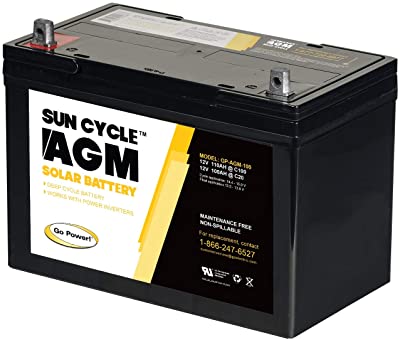Solar Panel Authority Canada
Choosing Batteries For DIY Solar: Reviewing Lead-Acid Batteries
Hello Solar Fans!
When embarking on a DIY solar installation project in Canada, one crucial aspect to consider is the type of battery that will store and provide energy when the sun isn't shining. Among the various options available, lead-acid batteries have long been a popular choice for their reliability and affordability. In this blog post, we will delve into lead-acid batteries, their functionality, and their suitability for DIY solar installations in Canada.

Understanding How Lead-Acid Batteries Work:
Lead-acid batteries are based on a technology that has been around for many years. They consist of a series of lead plates submerged in an electrolyte solution of sulfuric acid. When the battery is charged, a chemical reaction occurs, converting electrical energy into potential chemical energy. This process causes the lead plates to transform into lead sulfate and releases electrons. During discharge, the reverse reaction takes place, converting the stored chemical energy back into electrical energy.
Advantages of Lead-Acid Batteries for DIY Solar Installations:
- Affordability: Lead-acid batteries are relatively cost-effective compared to other battery types, making them an attractive option for homeowners on a budget.
- Durability: These batteries are known for their ability to withstand extreme temperature fluctuations, making them suitable for Canadian climates.
- Availability: Lead-acid batteries are widely available in the market, ensuring easy accessibility for DIY enthusiasts.
- Proven Technology: With a long history of use in various applications, lead-acid batteries have established their reliability and performance.
Limitations of Lead-Acid Batteries:
- Weight and Size: Lead-acid batteries are heavier and bulkier compared to newer battery technologies, which can present challenges during installation and maintenance.
- Limited Depth of Discharge: These batteries are best suited for applications where shallow discharges are preferred, as deep discharges can significantly reduce their lifespan.
- Shorter Lifespan: Lead-acid batteries generally have a shorter lifespan compared to technologies like lithium-ion batteries, requiring replacement more frequently.
- Lead-acid batteries are generally considered to have a higher environmental impact compared to other of batteries due to the fact that lead-acid batteries contain lead and sulfuric acid, which can be harmful to the environment if not properly managed.
Considering Alternatives:
While lead-acid batteries have their advantages, it's important to consider alternative battery technologies, such as lithium-ion batteries. Lithium-ion batteries offer higher energy density, longer lifespan, and lighter weight, making them an appealing choice for DIY solar installations. However, they come at a higher cost compared to lead-acid batteries. Assessing individual energy needs, budget constraints, and system requirements will help determine the most suitable battery type for your DIY solar project in Canada.
Conclusion:
Lead-acid batteries have been a reliable and cost-effective option for DIY solar installations in Canada. Their durability, availability, and proven technology have made them a popular choice among homeowners. However, it's important to weigh the advantages and limitations of lead-acid batteries against alternative technologies to make an informed decision. Ultimately, consulting with experts and conducting thorough research will help ensure you choose the right battery type for your DIY solar installation, maximizing energy storage and optimizing the performance of your system.
Happy shopping :)
Katie
- Posted On: June 20, 2023
Send us your feedback:
Recent Blog Entries...
- Net Metering In Ontario-A Guide To Efficient Home Energy
- Comparing Solar Installations Professional Vs DIY
- Why Solar Energy Shines Brighter For Homes Than Geothermal Energy
- The Economics Of DIY Solar Projects In Canada
- Choosing The Right Inverter For DIY Solar
- Installing Solar Panels A Complete DIY Guide


Comments & Replies
J.J. Says:
Are these the same as batteries in a car? Would it work if I just go out to the car junk yard and get a bunch of old batteries and wire them up? It would save me a ton of money and save them from going to the dump. What do you think?
Join the conversation using the form below...